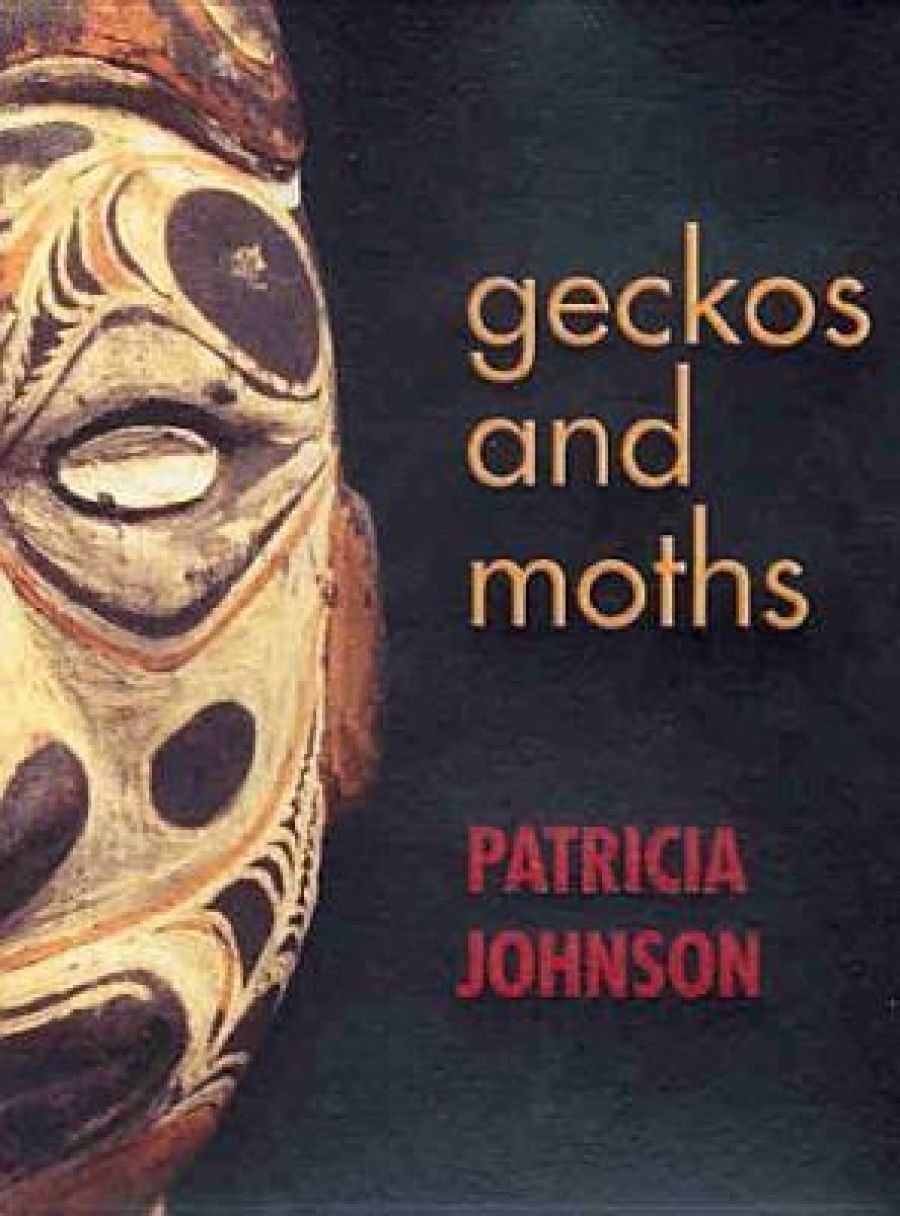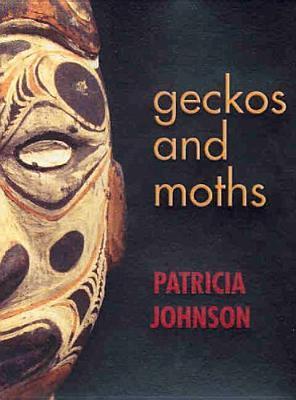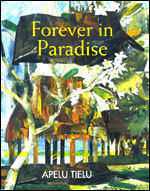
- Free Article: No
- Contents Category: Fiction
- Review Article: Yes
- Article Title: Tropical Dream
- Online Only: No
- Custom Highlight Text:
Geckos and Moths is a time capsule. A note by the author, Patricia Johnson, indicates that the first draft of the book was written thirty years ago, after her partner had drowned in the Trobriand Islands. In many cases, a book begun so long ago and in such circumstances might best have been left in the bottom drawer.
- Book 1 Title: Geckos and Moths
- Book 1 Biblio: Pandanus, $29.95 pb, 288 pp
- Book 1 Cover Small (400 x 600):

- Book 1 Cover (800 x 1200):

- Book 2 Title: Forever in Paradise
- Book 2 Biblio: Pandanus, $29.95 pb, 455 pp
- Book 2 Cover Small (400 x 600):

- Book 2 Cover (800 x 1200):

Geckos and Moths is more about Australians than it is about New Guineans. Ted Rich runs a bus company in Port Moresby. He doesn’t trust blacks and lays off his best driver when the driver asks for a pay rise. He is on the local council and supports segregated swimming pools, as much, of course, for the benefit of the natives as for anybody else. He does not have the sensitivity to realise he is putting himself in the path of revenge. He hates Godfrey Warner, a gay writer, and can’t find words to describe his disgust that Warner is having sex with natives. Yet when Merle Leibman, a young anthropologist from Harvard, announces that she wants to have sex with old native men as part of her research into customs, he experiences a frisson.
Ted is married to Virginia. Virginia is drinking too much. She is bored with the company of other white women, such as Linda Morton, and with endless talk of babies and house staff. She is drawn to Warner. Her employer, Mr Longhurst, has been subsidised to wring as much for himself as possible out of the local economy. Virginia wonders what she was expecting when she came to Papua New Guinea, as soon as she was married, on the arm of a man who had been Moresby’s most eligible bachelor:
[S]he had imagined herself in Gauguin colours, things sheer, loose and free. In her mind’s eye, she had seen herself, under thatched roofs, long hair falling over fingers strumming a guitar, handsome husband Ted listening and falling in love. Was it her fault – or her stupidity – that the dream had nothing to do with reality?
Geckos and Moths deals incisively, yet without histrionics, with the unravelling of a dream and the fraying of an Australian colonial fiction.
Forever in Paradise is, on the other hand, unable to deal realistically with human imperfection. The book is infatuated with its central character. Solomona Tuisamoa. The problem is that Solomona is a pompous ore. He is such an impossibly wise, just, kind, caring and virtuous man that is difficult to relate to him at any level.
This is a pity. Forever in Paradise wants to be a visionary novel. It wants to show how a country such as Samoa can be redeemed by the efforts of a superhuman being who manages to get villages and communities working together and living in perfect harmony. It would require an extraordinary literary talent to make such a wholesome fiction plausible. Apelu Tielu obviously cares deeply about Samoa. But he has set himself one of the most difficult tasks in fiction: the didactic novel. The didactic novel requires rare subtlety and dexterity to hold the attention of the class. This one lacks those attributes in any measure.
We first meet Solomona when he returns to New Zealand to further his studies in the economies of developing nations. He is met at the airport by Helen Jones, the woman whom it is soon clear he will marry. He just takes hundreds of pages to get around to it. Helen has a new car, a Passat. Her father bought it for her as a birthday present. Solomona refuses to get into it, as Passat is owned by Volkswagen, a company that sided with Hitler during the war. Solomona delivers a speech about it right there at the airport (he gives a lot of speeches in this book), but Helen is not too worried. ‘You don’t have to apologise for your convictions,’ she says. She gets a new car. She should have got a new boyfriend.
Before long, it turns out that Solomona’s sister, Fetuao, is pregnant. She isn’t married. Solomona pleads for restraint within a family culture that could react violently to this situation. Much later, he does something similar in Samoa to stop revenge taking place for the death of a boy during a cricket match. Solomona’s instinct against violence is, of course, praiseworthy. But he wins the argument with monotonous regularity. His sister is not well during the pregnancy and a doctor recommends a termination. Solomona calls the shots. He feels strongly about abortion and delivers a speech about it. He says that, much as he loves his sister, he will not pretend to be god. Unfortunately, even as he says this, he is starting to sound more and more like god. Fetuao, potentially a far more rich and engaging character than either the cartoon hero or heroine, soon disappears from the novel, only to make an occasional cameo appearance. When Solomona’s father is dying, Solomona makes a speech about the evil of euthanasia. Again, he says he is not god and again he sounds like god. On the day of his father’s funeral, he provides Helen with insights into the dynamic of the ritual in terms of the local economy.
This is a novel without tension. For example, after Solomona survives a car accident, it is clear he has great work to do. His accession to the leadership of his clan is briefly delayed by one kinsman whose anxieties are soon allayed. A cyclone levels the village while Solomona and Helen are on their honeymoon in America. The tragedy only enables Solomona to return immediately to have the place rebuilt better than it was before.
The novel is obsessed with sex. This obsession is evidenced in the constant reiteration of the fact that both Solomona and Helen will remain virgins until they marry and that they will not marry until Solomona has done the right thing by his people. Solomona’s sexual continence is stressed over and over again. He never, ever does anything wrong. He never faces a dilemma to which any personal shortcoming has contributed. All his challenges come from outside himself. His triumphs soon become dreary reading.
Apelu Tielu would seem to have strong views on the role of economic aid in a developing economy such as Samoa and on the harmony and integration of Christianity with traditional culture. He has a deep knowledge of Samoan lore. All of this could have been exploited in an interesting way. Forever in Paradise is, however, too idealistic to touch the earth it wants to transform.


Comments powered by CComment